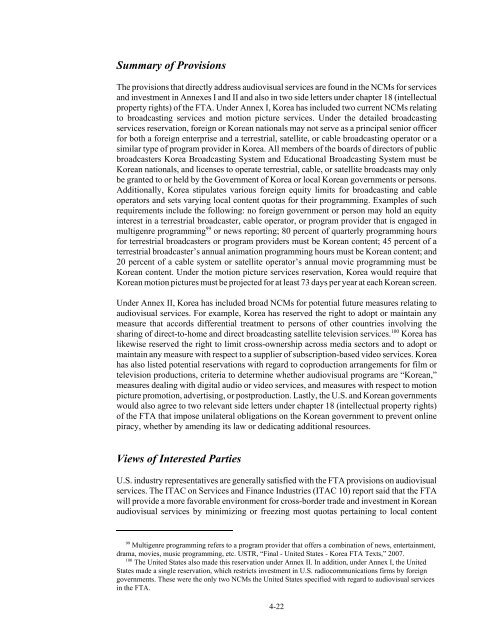U.S.-Korea Free Trade Agreement: Potential Economy-wide ... - USITC
U.S.-Korea Free Trade Agreement: Potential Economy-wide ... - USITC
U.S.-Korea Free Trade Agreement: Potential Economy-wide ... - USITC
You also want an ePaper? Increase the reach of your titles
YUMPU automatically turns print PDFs into web optimized ePapers that Google loves.
Summary of Provisions<br />
The provisions that directly address audiovisual services are found in the NCMs for services<br />
and investment in Annexes I and II and also in two side letters under chapter 18 (intellectual<br />
property rights) of the FTA. Under Annex I, <strong>Korea</strong> has included two current NCMs relating<br />
to broadcasting services and motion picture services. Under the detailed broadcasting<br />
services reservation, foreign or <strong>Korea</strong>n nationals may not serve as a principal senior officer<br />
for both a foreign enterprise and a terrestrial, satellite, or cable broadcasting operator or a<br />
similar type of program provider in <strong>Korea</strong>. All members of the boards of directors of public<br />
broadcasters <strong>Korea</strong> Broadcasting System and Educational Broadcasting System must be<br />
<strong>Korea</strong>n nationals, and licenses to operate terrestrial, cable, or satellite broadcasts may only<br />
be granted to or held by the Government of <strong>Korea</strong> or local <strong>Korea</strong>n governments or persons.<br />
Additionally, <strong>Korea</strong> stipulates various foreign equity limits for broadcasting and cable<br />
operators and sets varying local content quotas for their programming. Examples of such<br />
requirements include the following: no foreign government or person may hold an equity<br />
interest in a terrestrial broadcaster, cable operator, or program provider that is engaged in<br />
multigenre programming 99 or news reporting; 80 percent of quarterly programming hours<br />
for terrestrial broadcasters or program providers must be <strong>Korea</strong>n content; 45 percent of a<br />
terrestrial broadcaster’s annual animation programming hours must be <strong>Korea</strong>n content; and<br />
20 percent of a cable system or satellite operator’s annual movie programming must be<br />
<strong>Korea</strong>n content. Under the motion picture services reservation, <strong>Korea</strong> would require that<br />
<strong>Korea</strong>n motion pictures must be projected for at least 73 days per year at each <strong>Korea</strong>n screen.<br />
Under Annex II, <strong>Korea</strong> has included broad NCMs for potential future measures relating to<br />
audiovisual services. For example, <strong>Korea</strong> has reserved the right to adopt or maintain any<br />
measure that accords differential treatment to persons of other countries involving the<br />
sharing of direct-to-home and direct broadcasting satellite television services. 100 <strong>Korea</strong> has<br />
likewise reserved the right to limit cross-ownership across media sectors and to adopt or<br />
maintain any measure with respect to a supplier of subscription-based video services. <strong>Korea</strong><br />
has also listed potential reservations with regard to coproduction arrangements for film or<br />
television productions, criteria to determine whether audiovisual programs are “<strong>Korea</strong>n,”<br />
measures dealing with digital audio or video services, and measures with respect to motion<br />
picture promotion, advertising, or postproduction. Lastly, the U.S. and <strong>Korea</strong>n governments<br />
would also agree to two relevant side letters under chapter 18 (intellectual property rights)<br />
of the FTA that impose unilateral obligations on the <strong>Korea</strong>n government to prevent online<br />
piracy, whether by amending its law or dedicating additional resources.<br />
Views of Interested Parties<br />
U.S. industry representatives are generally satisfied with the FTA provisions on audiovisual<br />
services. The ITAC on Services and Finance Industries (ITAC 10) report said that the FTA<br />
will provide a more favorable environment for cross-border trade and investment in <strong>Korea</strong>n<br />
audiovisual services by minimizing or freezing most quotas pertaining to local content<br />
99 Multigenre programming refers to a program provider that offers a combination of news, entertainment,<br />
drama, movies, music programming, etc. USTR, “Final - United States - <strong>Korea</strong> FTA Texts,” 2007.<br />
100 The United States also made this reservation under Annex II. In addition, under Annex I, the United<br />
States made a single reservation, which restricts investment in U.S. radiocommunications firms by foreign<br />
governments. These were the only two NCMs the United States specified with regard to audiovisual services<br />
in the FTA.<br />
4-22

















